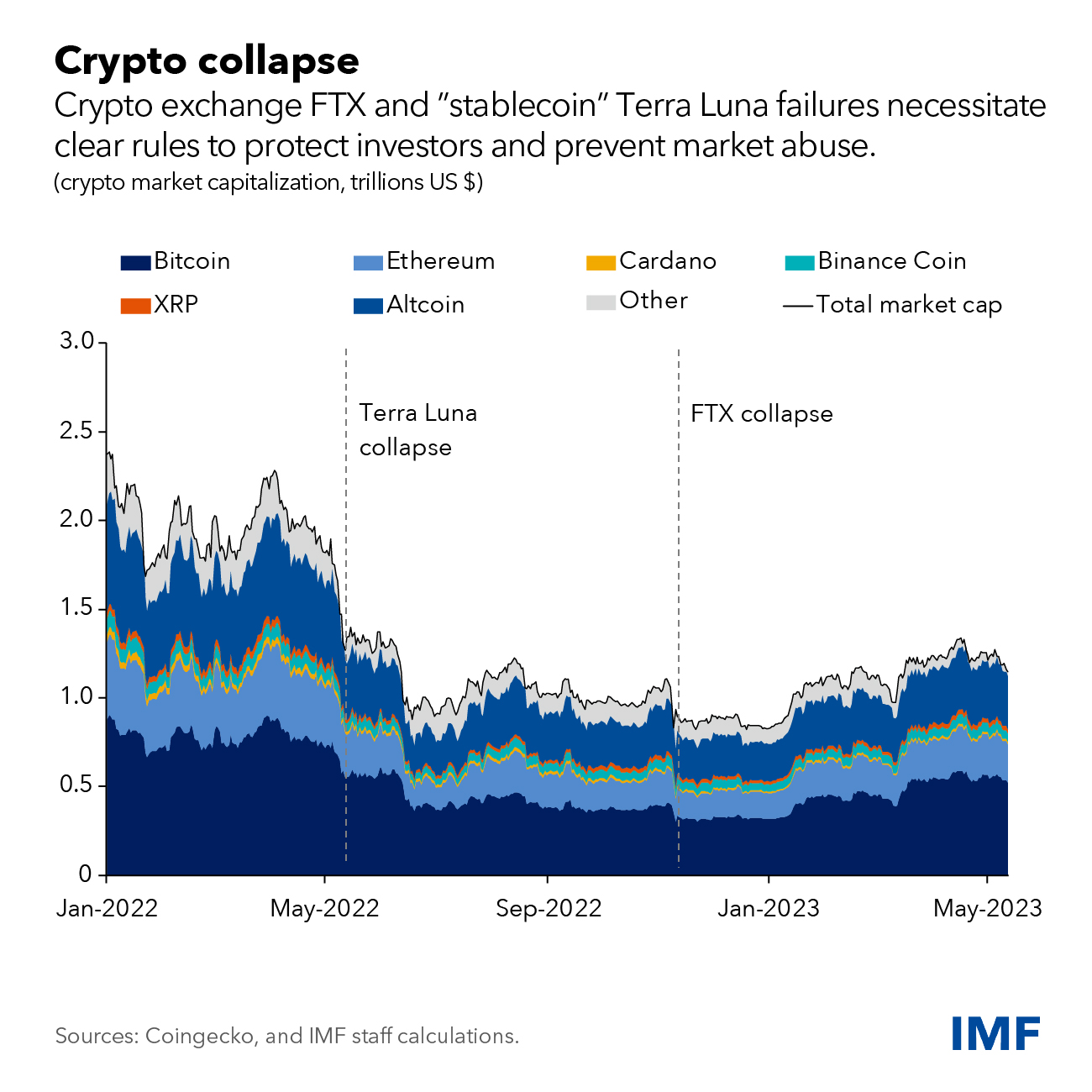
By Tobias Adrian, Dong He, Arif Ismail, and Marina Moretti*
The global push for clearer policies on crypto assets has gained momentum under the Indian G20 Presidency. As this work continues, it’s important to recognise the progress already achieved, but more is needed, especially in implementing global standards.
Last year’s failures of the FTX crypto trading platform and the Terra Luna stablecoin highlighted the urgency of establishing clear policies to protect investors and prevent abuse. Despite recent industry challenges, investor optimism continues to revive periodically, as evidenced by Bitcoin’s near doubling this year. Without robust safeguards, the increased risk of fraud and misconduct could adversely impact investors' expected returns.
While some policymakers have taken necessary steps to safeguard consumers and ensure financial integrity, it is equally important to consider the broader implications of crypto. Such assets, particularly stablecoins denominated in hard currencies, could potentially replace official currencies, and significantly impact countries' monetary and fiscal policies. This is especially true in emerging markets and developing economies, underscoring the need for a comprehensive, consistent, and coordinated policy approach to crypto.
That’s why we presented an assessment of the macro implications of crypto assets to the G20 presidency earlier this year, building on recommendations outlined in the Elements of Effective Policies for Crypto Assets endorsed by the IMF Executive Board in February.
Our approach features three key pillars: a sound macro-policy foundation, clear legal treatment and granular rules, and effective implementation.
These are our key policy recommendations:
- The defense against the substitution of sovereign currencies is the maintenance of robust, trusted, and credible domestic institutions. Transparent, consistent, and coherent monetary policy frameworks are crucial for an effective response to the challenges posed by crypto assets.
- To protect national sovereignty, it is important not to grant crypto assets official currency or legal tender status. Doing so would require accepting them in many jurisdictions for tax payments, fines, and debt settlements, and could generate fiscal risks for government finances, and could threaten financial stability or rapid inflation.
- To address the volatility of capital flows associated with crypto, policymakers should integrate them within existing regimes and rules that manage capital flows. This will help ensure stability and minimise potential disruptions.
- Finally, tax policies should ensure unambiguous treatment of crypto assets, and administrators should strengthen compliance efforts. Specific regulations are needed to clarify the tax treatment of crypto, including value-added taxes or levies on income or wealth.
Clear legal treatment
Building on a sound macro-policy foundation, clear legal treatment and granular rules are crucial. The principle of "same activity, same risk, same regulations" should guide regulatory efforts.
Consistent with the recommendations by standard setters such as the Basel Committee on Banking Supervision, Financial Action Task Force, Financial Stability Board, and the International Organisation of Securities Commissions, our recommendations are:
- A comprehensive legal foundation is essential to effectively regulate crypto, addressing both private law and financial law aspects. This includes ensuring predictability and enforceability of rights while appropriately classifying crypto.
- Strong anti-money laundering and combating the financing of terrorism (AML/CFT), prudential and conduct rules should be implemented to cover all entities and activities related to the issuance, trading, custody, or transfer of crypto.
- For systemic stablecoin arrangements, additional requirements such as the Principles for Financial Market Infrastructures - standards that aim to ensure the safety, efficiency, and resilience of FMIs - should be applied.
Significantly, the FSB in July established a set of high-level recommendations for crypto regulation, focusing on financial stability. They include ensuring authorities’ regulatory powers and sound governance and risk management practices by providers. It also features revised high-level recommendations for effectively addressing financial stability risks associated with "global stablecoin" arrangements.
Overall, the recommendations promote the consistency and comprehensiveness of regulatory, supervisory and oversight approaches to crypto.
Effective implementation
Finally, ensuring effective policies requires several measures including strong coordination, at the domestic and international level:
- National authorities must align their frameworks to the emerging guidelines, and standards being developed by standard setting bodies. This alignment is critical to achieve consistent treatment of crypto assets and may require legislative changes.
- Developing strong supervisory capacity is vital for monitoring and enforcing rules effectively. Authorities must have the necessary skills and resources to oversee the evolving crypto asset landscape.
- Given the borderless nature of the crypto-assets ecosystem, international collaboration and information sharing are crucial. Cooperation among supervisors and competent authorities will enable the monitoring of crypto asset service providers and maintain the efficacy of regulatory policies.
- Going beyond crypto polices,public authorities should take advantage in the progress in digital technology to enhance public policy objectives and must actively collaborate to address ongoing cost, trust, and speed issues, particularly for cross-border payments. New multilateral platforms could improve the efficiency of transactions.
The IMF will continue to support the G20 by delivering to the Leaders’ Summit in September a joint IMF-FSB synthesis paper highlighting the building blocks for effective crypto policies. In addition, we are committed to providing tailored capacity building to our 190 members based on the above recommendations and emerging guidelines from standard setters. Our surveillance program will also assess the effectiveness of policy frameworks including crypto.
By embracing a comprehensive approach and implementing these recommendations, policymakers can safeguard monetary sovereignty, protect investor interests, and promote financial stability in the digital age.
The authors are all heads of departments at the IMF. This is a re-post of an article that ran on the IMF blog.
14 Comments
In other words let's regulate crypto so it's as expensive to use as existing money.
SURPRISE!!!
"The authors are all heads of departments at the IMF. This is a re-post of an article that ran on the IMF blog."
"To protect national sovereignty, it is important not to grant crypto assets official currency or legal tender status."
Historical reference: Kodak is asking us not to use digital cameras because they are very dangerous.
Those giant market failures like FTX and Terra Luna were because of the lack of govt regulation. How many years does it take?
Fumbling around does nothing.
Crypto is a threat, they just don't know how to mitigate that threat without being anti freedom or anti capitalist.
Then again, considering we've failed as a society to regulate and keep the current financial system in check just shows the failure of those in charge.
Then again, considering we've failed as a society to regulate and keep the current financial system in check just shows the failure of those in charge.
Well let's take a look at the mighty US of A. This is astounding.
The Second Circuit Court of Appeals recently asked the SEC Governor to independently weigh in on an issue regarding whether or not they believed leveraged loans to be securities.
The SEC said it is “not in a position to file” a brief giving its view on whether leveraged loans are securities, sidestepping a request to weigh in on a long-running lawsuit that may have major implications for the $1.4 trillion market for risky debt.
There is zero accountability.
https://www.bloomberg.com/news/articles/2023-07-18/sec-declines-to-shar…
Haha national sovereignty was lost the moment "money" creation was given to private banks, without any mandate to do so...
You understand well young Jedi
If only I was still a young Jedi
Article about crypto, scroll down to see authors affiliations....IMF
I know this will be a good read 😂
Edit:
The G20 paper on macro issues from Crypto was kinda interesting.
Basically is says, it isnt problem yet, but it could stop us controlling everything incthe future. Thought this was the best section:
Relatedly, the adoption of crypto assets could erode the effectiveness of CFMs. Crypto
trading volumes are robustly higher in countries with tighter capital controls, as are Bitcoin price
premia, consistent CFM circumvention (Furceri and others, forthcoming). First, CFM laws and
regulations will need time to be upgraded to cover crypto assets.13 Second, in the case of
pseudonymous crypto assets, prosecution and sanctioning may be difficult. Third, unbacked tokens
often do not involve any intermediaries or service providers which can be held responsible to
comply with CFMs. He and others (2022) offer more details.
Also I noted the countries they based their research on were: India, Indonesia, Japan, Philippines, Republic of Korea, Singapore, South Africa and Sri Lanka. So nothing from the middle east, south America or Africa which is where we know Bitcoin and stable coins are seeing a significant amount of use. Especially Nigeria for example.
Alex Gladstein has written a powerful examination of an immensely important question that is usually overlooked in academia and media: What gives the World Bank and IMF such exorbitant power over the politics and finances of developing countries? By examining the monetary foundations of the question, Alex offers an astute assessment of the perverse incentives facing international financial institutions, and a compelling explanation for why the real beneficiaries of their programs are western financial institutions and governments, while the victims are the world's poorest people.
—Safidean Ammous, Author, The Bitcoin Standard and The Fiat Standard
https://www.amazon.com/Hidden-Repression-Exploitation-Development-Glads…
Yes Alex does fantastic work. He's recent book on how the IMF oppresses countries through their loans is a crazy read.
It is like listening to a Tapeworm give you dietary advice.
A heap of suckers lost a bundle in the crypto implosion.
Reading all the posts on the internet about how to 'invest' your funds into such 'can't miss' bets like FTX, BoringCoin and Bitconnect has to be one of the biggest rug-pulls of all time.
I've seen plenty of manias and have zero sympathy.
If one chooses to 'invest' in a ponzi like bitconnect rather than projects like aave or curve, then yes, I also have little sympathy.
As for this article... instantly dismissed based the authors affiliation.


We welcome your comments below. If you are not already registered, please register to comment
Remember we welcome robust, respectful and insightful debate. We don't welcome abusive or defamatory comments and will de-register those repeatedly making such comments. Our current comment policy is here.